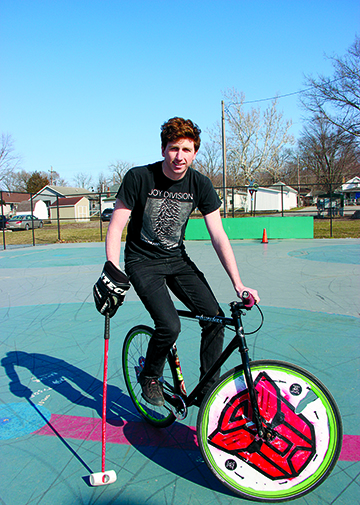Biology With A Side of Bike Polo
06-28-2013
Writer(s): Tim Brouk
Photograph by: Tim Brouk

Grad student breaks ground in new sport
As one of the first graduate students in Purdue's fledgling biology education graduate program, Caleb Trujillo is leading the pack in a growing discipline. As a member of a local bike polo team, he is setting the pace in a quirky sport that is growing in popularity across the nation.
Trujillo is on his way to a PhD in a program that looks at how biologists explain cellular and molecular mechanisms in the hopes of better understanding how mastery is learned. He is, in a manner of speaking, taking his frustrations out in graduate school.
"Molecular biology is a difficult subject to learn and a lot of what I'm doing now is driven by that frustration as an undergrad," says Trujillo, who is a member of the Society of
Advancement for Biology Education Research. "If you think about the field, it's jargon-filled. It uses a lot of abstract models. The field is rapidly changing. ... You can't experience it very well. You need microscopes and tools and those are expensive. So, how are we going to teach this generation of scientists if we have these challenges ahead of them?"
The Department of Chemistry's chemistry education graduate program is one of the best in the nation and the Department of Biological Sciences hopes to cultivate a similar presence in looking at how the field is taught today.
"Caleb is the first that we recruited on a doctoral level," says Nancy Pelaez, associate professor of biological sciences. "His project has to do with biological mechanisms. He is thinking about research from a systems level approach."
Pelaez and Trujillo believe biology is still being taught the same way that their parents were taught. However, textbooks are getting thicker and thicker as discoveries in science are still being made in rapid fashion.
Trujillo and his colleagues in the Department of Biological Sciences are breaking biology education down to its foundation to figure out how it can be better taught in 2013 educational formats — from how explanations are formulated to how biological concepts can be taught best in a digital world. The psychology and understanding behind learning in general is looked at as well. Over the past few years, Trujillo has interviewed and surveyed experts and students to help guide his research.
"Experts and novices differ in how they process, retrieve and manipulate information. However, expertise is specific to a given domain," Trujillo says. "My research is guided by two questions. First, what patterns exist when expert biologists provide mechanistic explanations of cells? Second, how do the explanations of biologists vary among sub-disciplines?"
In early fall 2010, during a walk across campus, Trujillo — a native of Colorado who grew up mountain biking — heard some shouting, chain link fence-rattling and clanging coming from basketball courts near the Black Cultural Center. There, he found activity that looked like a combination of his two favorite sports, biking and hockey. It was a bike polo match — players ride bicycles instead of horses and wield polo mallets.
"I went up to them and said 'What do you call this?' " Trujillo recalls. "They told me to try it out and I did. I really liked it. It was challenging."
In the following two-plus years, bike polo has grown in popularity in the area and across the nation. When Trujillo first got on the court, he used his single-speed commuter bicycle, along with homemade mallets fashioned from ski poles and gas piping. Today, companies make bikes and equipment specifically for bike polo. Since the sport requires a tremendous amount of balance and mobility, using just any bike is not recommended for bike polo.
Bike polo is played three-on-three with two goals, similar to hockey. However, instead of having a faceoff, the teams rush for the ball placed in the center of the court while on their bikes. Players' feet cannot touch the court. If a player loses balances and touches the court, he or she must leave the play and tag the side of the court before rejoining. Opponents get a quick little power play.
Trujillo has become a leader on the court, and with his 6'3" frame and long reach, one of the top local players. He has also become an advocate for local bicycle safety and culture, and helped establish the Bicycle Lafayette club. Trujillo also resurrected "Critical Mass," a monthly group bike ride through the streets of West Lafayette and Lafayette. He commutes to campus via pedal power, too.